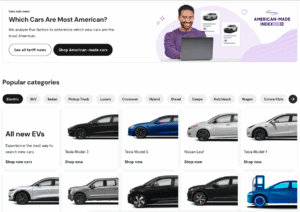Ready to start a business? Then get set to enter the world of domain name buying. In this post, NameExperts.com Director Joe Uddeme covers all the pricing information a newcomer to domain names needs to know.
When it’s time to start your business online, securing a domain name is the first step. Regardless of whether or not your business is established, you can’t create a website without a domain name.
If you’re like most business owners, you’re probably wondering how much do domain names cost? You might also have questions about how much time you should spend looking for the right URL or even how to buy a domain name.
We’ve got the inside scoop on what you need to know.
Your domain name essentially functions as your website’s address, so you want to make sure you have one that is simple and relevant. You’ll also want to make sure it’s easy to remember so that people can easily find you and your business online.
With all of that in mind, it’s easy to see why some people are willing to break the bank to get the domain name they want.
If your domain name is just right, it can greatly increase website traffic. Discover everything you need to know about domain names and how much they cost right here.
Key Takeaways
- A beginner’s guide to domain names
- Pricing details for domain name buyers
- How a domain broker can secure a better price and streamline the process
Pricing for Domain Names – the Inside Guide
Ready to delve into domain names and what they cost? Let’s start with the basics:
What Is A Domain Name
You don’t want to shell out a ton of money on a domain name without first understanding what you’re paying for. We mentioned it earlier, but a domain name is the web address you type into a browser to bring up your specific website.
It typically will start with https or www and will end with something common like .com. You’ll recognize some of the higher profile (read: high traffic volume) domain names like www.google.com or www.irs.com.

Why Do You Need To Purchase One
If you want to have a website, then registering your domain is absolutely necessary. There are three main reasons why you might need to buy a domain.
1. You’re building a website. You’ll most likely use a domain name that ties in with your business name or utilizes keywords that are related to your company. This is a non-negotiable part of the business world – you need a domain name.
2. Another reason you might register a domain name is when you’re considering starting a business or website. If you have a great idea for a business or a website, then you might want to jump on registering the domain you want. Stake your claim before anyone else comes along and takes it before you’re ready to execute. Check out our guide to finding a great brand name for your business.
3. The third reason that people start to wonder how much domain names cost and start registering domain names is when they are investing. Domain name investing was really popular at the start of the internet age, when popular keywords were still available.
Nowadays, a lot of domain names are already taken (read: what to do if the domain you want is taken), but domain investing can still be a great way to earn money.
If you’re working with a broker who is managing your domain portfolio, you can find domains that have the potential for significant value and buy them now so that you can sell them for a profit later.
How Much Do Domain Names Cost
In general, you can purchase a domain name for $2-$20 a year, depending on discounts available and who you’re purchasing it from. Newer domain extensions, the part at the end of your address, like .app or .info might cost more, as they are newer on the market.
We can break down how much domain names cost based on a couple of factors. Like we just said, the domain extension can increase the price – for example, using .com might be more expensive than .shop.
Where you purchase your domain name is another factor. A reputable registrar might be less expensive than an aftermarket service or private seller.
Additionally, if you choose to register for multiple years and elect to include domain privacy it can also increase or decrease the price of your domain name. You’ll find that the most expensive domain names will be the ones you’ll find on auction houses, through private sellers, or aftermarket services.
Unfortunately, there are no hard or definitive prices for domain names, regardless of the avenue you choose to purchase from. The domain name industry varies, just like real estate. Sometimes it’s a seller’s market, sometimes it’s a buyer’s market – as our guide to domain name valuation illustrates.
Scarcity, though, is what drives domain name prices to eye-watering levels. Add in desirabilty, and you have a recipe for domain name costs that can shoot through the roof. The most expensive domain name ever sold – cars.com – went for just a little short of a billion dollars.
Make sure you consult a domain broker if you’re looking to buy from a private seller, or are looking to purchase a domain that is already owned. Brokers are experienced and can handle all of the ins and outs of the acquisition and negotiation process so that you get the domain you deserve at a fair price.

Why You Should Consider Hiring A Broker
As mentioned above, hiring an experienced domain broker might be the best idea to make sure you get the domain you want. However, for a readily-available name, such as parkmylimo.com, there’s no need – it’s yours from any of the registration companies for just a few dollars.
If you can be flexible when the domain you want isn’t available, that’s another great way to snap up a bargain, too.
Sometimes, though, you can’t proceed without a certain domain name. Even the mighty Tesla struggled to do what they wanted with the brand because they didn’t own tesla.com. They eventually bought it – after many years of negotiations and a price tag thought to be in the many millions.
A broker with experience will know the market inside out. He or she will have a thick contact book, and their years of experience provide leverage when negotiating the best price for you.
If going it alone, look out for hidden fees, discount scams, and even hidden costs in your written agreements. This is where having a domain broker on your side comes in handy. They know the lingo, they’ve negotiated before, and they aren’t emotionally invested, which means they just want to get you the best deal.
Let a broker help you navigate this industry and help you determine what might be too good to be true. Sometimes, when a great domain seems really cheap, it might be because there are hidden fees when registering. A domain broker can help you choose a reputable registrar and find the right price.
About the author
Joe Uddeme is Director and Principal of Name Experts, one of the world’s leading domain name brokerage services. He has overseen domain name sales and acquisitions totaling more than $150 million and is renowned worldwide as a go-to expert in buying and selling premium domains. Contact us at: [email protected]












